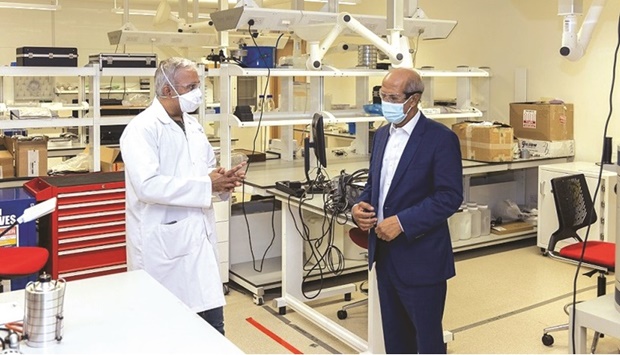Hamad Bin Khalifa University (HBKU)’s College of Law recently hosted ambassador Hasan Kleib, deputy director general of the World Intellectual Property Organisation (WIPO), for a working visit with Qatar Foundation (QF) leaders, senior officials from the Ministry of Commerce and Industry (MoCI), and Qatar’s office to the World Trade Organisation (WTO).
Discussions focused on efforts to strengthen Qatar’s national innovation ecosystem through a robust framework of intellectual property (IP) protection. A particular focus was the role of IP in sustaining QF’s unique research and innovation ecosystem, which contributes to Qatar’s competitive and diversified economy in the form of technologies and other high-value IP that address needs in artificial intelligence, genomics, precision medicine, sustainability, and other areas.
Dr Francisco Marmolejo, president of Higher Education at QF, and Dr Michael J Benedik, HBKU provost, presented welcoming remarks. In his response, ambassador Kleib shared WIPO’s vision of IP as a driver of growth and development. He highlighted areas of future co-operation to promote education in IP law, following a memorandum of understanding signed between WIPO, MoCI, and HBKU in February 2022.
Qatar’s national IP protection strategy, international commitments, and growing role worldwide were the focus of presentations by Saleh al-Mana, Director of International Co-operation at MoCI, and Ahmed Essa al-Sulaiti (HBKU, Juris Doctor, 2018), acting director in Qatar's office to the WTO. To present an overview of the pioneering research underway at QF, the meeting included a presentation by Dr Patrick Linke, Professor of Chemical Engineering, progamme chair, and holder of the Qatar Shell Professorship for Energy and Environment, Texas A&M University at Qatar. In turn, Dr Rachid Zaffou, senior planning and research director at HBKU, and Dr Amine Bermak, professor and associate dean of the College of Science and Engineering, discussed HBKU’s research strategy with its aim of transforming ideas into solutions for real-world challenges, working with a strong network of collaborators, including QF partners.
John T McEntire, director of Industry Development and Knowledge Transfer (IDTK), QF, expanded on the institution-wide mechanisms to safeguard and disseminate the innovative research outcomes developed by QF entities, or with QF support, as well as transform these ideas into impact. Commenting after the visit, dean Susan L Karamanian from HBKU’s College of Law, said: “The meeting has been valuable in highlighting successes, challenges, and opportunities for IP protection within QF’s unique ecosystem of knowledge. It is an area where the College of Law’s partnership with WIPO and MOCI paves the way for us to develop future areas of cooperation that build IP-related knowledge and skills that support Qatar’s innovation landscape.”
The visit by ambassador Kleib and his delegation concluded with a tour of the HBKU Research Complex, which houses the world-class facilities of Qatar Computing Research Institute (QCRI), Qatar Environment and Energy Research Institute (QEERI), and Qatar Biomedical Research Institute (QBRI).

WIPO deputy director general ambassador Hasan Kleib (right) during a tour of the HBKU Research Complex.
